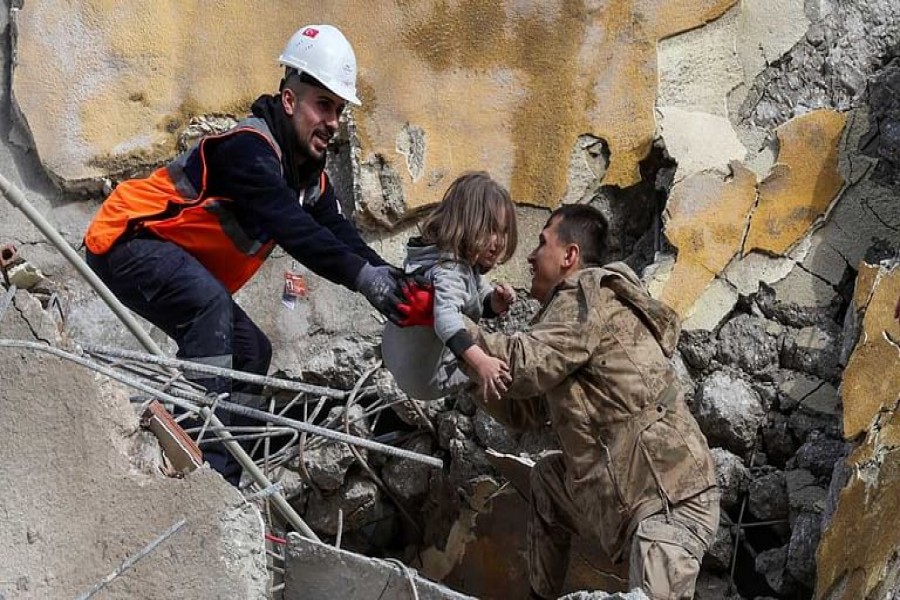It is simply nightmarish. An earthquake of 7.8 magnitude followed by another of 7.5 magnitude on Monday last killed thousands of people in south-eastern Turkey and north-western Syria. The death toll from the disaster by Thursday stood at around 13,000 people in Turkey and 3,000 in Syria, bringing the total to 16,000-plus. The figure may double, fears experts. The massive quake also injured more than 50 thousand. The widespread destruction due to the terrible tremor reduced most buildings and structures into rubbles. Rescuers are desperately scrambling through the debris to find survivors. Turkish President Recep Tayyip Erdogan declared a three-month state of emergency in the ten provinces worst affected by the quake.
This calamitous disaster hits Turkey in the year the nation is set to celebrate the 100th year of the Republic of Turkey (officially spelt Türkiye now). On October 29, 1923, Mustafa Kemal Ataturk (1881-1938), the army strongman finally declared the new republic after a series of conflicts and wars. Also known as Kemal Pasha, he became the first president of the newly formed republic. During his tenure until 1938, he transformed Turkish society 'from perceiving itself as a Muslim part of a vast Empire into a modern, democratic, and secular nation-state.' Poet Kazi Nazrul Islam wrote his famous poem titled "Kamal Pasha" (in Bengali) in 1921. Nazrul strongly believed in a revolutionary struggle to get the independence of India from British colonial rule. Nazrul was greatly inspired by the Turkish leader who took bold steps to come out from the obsession with the Ottoman Empire, or the Khilaphat to be more precise.
The Ottoman period spanned more than 600 years since 1299 when Osman the first, a leader of the Turkish tribes in Anatolia, founded the Empire. In 1453, Mehmed the second seized the ancient city of Constantinople and put an end to the 1,000-year reign of the Byzantine Empire. He renamed the city Istanbul which became the new capital of the Empire. The Empire flourished and expanded over the following decades. At its peak period, today's Turkey, Greece, Bulgaria, Egypt, Hungary, Macedonia, Romania, Jordan, Palestine, Lebanon, Syria, some parts of Arabia and also some portions of the North African coastal strip came under the Ottoman rulers who were either Sultan or Khalipha. The Khilaphat was linked to the Islamic government system.
The decline of the Empire started during the 1600s. The Ottomans began to lose their economic and military dominance over Europe for the next two centuries and countries attained independence. After the first World War, most Ottoman territories -- Jordan, Palestine, Lebanon, Syria -- were divided between Britain, France, Greece and Russia. The Empire officially ended in 1922, and the title of Ottoman Sultan was eliminated. Modern Turkey emerged from the broken empire which was a shock to many in the Muslim world. That's why Khilaphat movement in India was initiated in 1919 in an effort to save the Ottoman caliph as a symbol of unity among the Muslim community. They were, however, unable to understand the fast changing complex geo-politics in the world.
Again, despite the emergence and rise of modern Turkey over the last century, Ottoman history, heritage and culture still inspire many Turks. Some of them also feel that they have to revive the lost glory, although in a different manner. Exporting Turkish television series in more than 150 countries is such an effort. These serials have gained immense popularity in some courtiers, including Bangladesh. Turkey has also successfully manoeuvred its soft power in the Middle East, Central Asia and Bolkan regions. The country's military endeavour is well known, and its economic diplomacy is not negligible.
Nevertheless, there is no control over Nature, and it is impossible to avoid any natural disaster. The latest earthquake is thus a great tragedy for Turkey. For Syria, it spells more horror as the country, once a resourceful part of the Ottman Empire, is already on the brink of collapse due to decade-long wars, violence, conflicts and sanctions.


